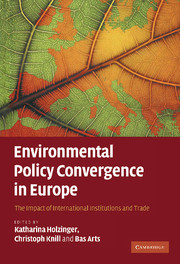Book contents
- Frontmatter
- Contents
- List of figures
- List of tables
- List of contributors
- Preface
- List of abbreviations
- 1 Introduction
- 2 State of the art – conceptualising environmental policy convergence
- 3 Theoretical framework: causal factors and convergence expectations
- 4 Research design, variables and data
- 5 Degree and direction of environmental policy convergence: analysis of aggregate data
- 6 The pair approach: what causes convergence of environmental policies?
- 7 The gap approach: what affects the direction of environmental policy convergence?
- 8 Conclusion
- Annex
- References
- Index
1 - Introduction
Published online by Cambridge University Press: 22 September 2009
- Frontmatter
- Contents
- List of figures
- List of tables
- List of contributors
- Preface
- List of abbreviations
- 1 Introduction
- 2 State of the art – conceptualising environmental policy convergence
- 3 Theoretical framework: causal factors and convergence expectations
- 4 Research design, variables and data
- 5 Degree and direction of environmental policy convergence: analysis of aggregate data
- 6 The pair approach: what causes convergence of environmental policies?
- 7 The gap approach: what affects the direction of environmental policy convergence?
- 8 Conclusion
- Annex
- References
- Index
Summary
One of the key issues of globalisation research in the social sciences is the question of whether globalisation leads to the convergence of political institutions, policies, the legal order and societal structures (Guillén 2001: 235). Is the world becoming ever more similar as a result of globalisation and Europeanisation as the ‘world society approach’ (Meyer et al. 1997) implies? Does the strong growth of economic and institutional interlinkages between nation states lead to increasingly similar policy measures across countries? Or is the search for convergence emerging from the domestic impact of globalisation and European integration ‘an impossible quest’ (Dimitrova and Steunenberg 2000: 201), because domestic responses to global or European challenges are strongly influenced by existing domestic structures and institutions (see, for example, Cowles, Caporaso and Risse 2001; Héritier et al. 2001; Knill 2001)?
Although there has been an intensified and renewed debate on the convergence and divergence of national policies in recent years, we still have a limited understanding of the phenomenon of policy convergence.
- Type
- Chapter
- Information
- Environmental Policy Convergence in EuropeThe Impact of International Institutions and Trade, pp. 1 - 6Publisher: Cambridge University PressPrint publication year: 2008

